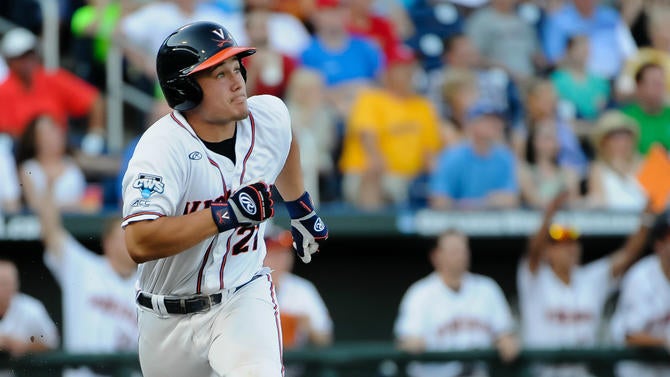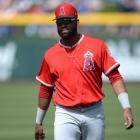The Los Angeles Angels' hunt for a frontline starter has led them to a familiar name. More than five years after they sent Mike Clevinger to Cleveland in a regrettable trade, the Angels have talked about reacquiring him, according to Jon Morosi of MLB.com. Morosi notes that there has been no "active dialogue" between the sides in recent days, and that Cleveland desired outfielder Jo Adell (the No. 2 prospect in baseball) and more in return.
Whether or not the Angels can work around this impasse to land Clevinger is to be seen. We wouldn't bet on general manager Billy Eppler finding a way to get a deal done, however, due to his lackluster farm system and the demand for Clevinger from other teams -- including the Los Angeles Dodgers, the Angels' top geographical rival who can offer a better multiplayer package.
For the Angels to land another arm, they'll likely have to leverage their financial might. With few exceptions, Eppler lacks tradeable young talent. He doesn't have much choice about making an addition, either: The Angels need another starter if they're serious about contending -- and, lest there be any doubt after the Anthony Rendon deal, league sources have told CBS Sports that owner Arte Moreno wants to win and is willing to spend money to make it happen. Hence the Angels being tied to David Price, whose contract the Boston Red Sox would like to shed.
To better illustrate the Angels' situation, let's take a look at their top trade chips. Note that the players are broken down into tiers:
- top prospects (those who could realistically anchor a trade)
- additional prospects of note (those who would fill out a package)
- cost-controlled players (anyone with three years or less of big-league service time)
- team-controlled players (anyone with more than three years but less than six years of service time)
- everyone else who might attract interest in negotiations

Top prospects
At the risk of sounding too pithy, the desired part of the Angels farm system is two players deep -- and they're both outfielders: the aforementioned Adell and Brandon Marsh.
Adell is the best prospect in baseball who is guaranteed to see the Show in 2020. (The Tampa Bay Rays tend to be conservative promoters, so shortstop Wander Franco is likely a year or more away.) He could finish his development with four tools that grade as plus or better, making him a dynamo at the dish, in the field, and on the basepaths. There are downsides worth noting, such as his swing-and-miss tendencies and his injury history, but he has All-Star potential.
Marsh doesn't have Adell's hype or ceiling. He does, nonetheless, have a high floor thanks to a well-rounded skill set. He can run, he can throw, and he can hit. Marsh batted .300/.383/.428 with seven home runs and 18 steals (on 23 tries) in Double-A, and there's a non-zero chance he learns to better tap into his raw power as he matures. He too should play in the majors in 2020.
Marsh is the likelier of the two to go by default. Prospects with Adell's potential are seldom moved in general, and almost never when they're this close to the majors.
Additional prospects of note
The rest of our Angels' top five featured three upside plays of varying intrigue: outfielder Jordyn Adams, second baseman Jahmai Jones, and infielder Jeremiah Jackson. (You can read more about their specific cases by clicking here.) League sources have informed CBS Sports that the Angels have been shopping Jackson the most of the three.
Some other prospects of note in the Angels system include outfielder D'Shawn Knowles, outfielder Kyren Paris, and right-hander Jose Soriano. First-round pick Will Wilson would've been mentioned here, except the Angels already dealt him to the San Francisco Giants in the Zack Cozart salary dump. Prior to that trade, the Angels tried using Wilson to land a starter.
Again, it's not a deep system.

Cost-controlled players
The star of this bunch is infielder David Fletcher, who fits every stereotype held about Angels hitters during the Mike Scioscia era. He's small and versatile and hit .290/.350/.384 while connecting on 90 percent of his swings. Fletcher figures to see significant action at second base (and perhaps in the outfield), so moving him would create more roster complications.
The Angels do have a few other infielders of note. Matt Thaiss is a former first-round pick who is big-league ready. He has a keen eye at the plate and did a better job of pulling the ball last season, resulting in a career-high 22 homers between Triple-A and the majors. Luis Rengifo showed patience, wheels, and defensive chops in his first big-league season. He profiles as at least a spare infielder type. Theoretically some team may get caught up in Taylor Ward's minor-league numbers, but he looks more like a Quad-A hitter to these eyes.
The Angels could try to move some of their young starters -- think Griffin Canning, Jaime Barria, Patrick Sandoval, and so on -- for a short-term fix. But other teams would be right to think that the Angels would just keep those lads for their own purposes if they were so great.
Then there's Keynan Middleton, who was the Angels' closer in 2018 before his elbow popped. He returned in August, showing reduced velocity and a newfound preference for his changeup over his slider. Relievers are volatile and it almost always makes sense to weigh trading them at their peak value. This is, to say the least, not Middleton's peak value.
Team-controlled players
We'll focus on three players in particular: Tommy La Stella, Cam Bedrosian, and Brian Goodwin.
La Stella more than doubled his career home run total last season by launching 16 dingers in his first 78 games. He then fractured his tibia on a foul tip, keeping him out from early July until the final series of the year. Despite the breakout, La Stella probably has more value to the Angels than he does to other teams. That's due in part to his impending free agency, and in part due to the fit problems he presents on most rosters as a protean, if not particularly skilled defender. It'll be on Joe Maddon to deploy him in creative ways that don't lead to overexposure -- think in tandem with Fletcher at the keystone, or at first base to give Albert Pujols a day off, or even at DH on the days when Shohei Ohtani is pitching or otherwise unavailable.
Bedrosian, now two years away from free agency, is perpetually available but never gets moved. Last season, he made his slider his primary offering for the first time. The shift helped his fastball's effectiveness, as opponents hit .204 against the heat after batting nearly .290 versus it the previous two seasons. Believe Bedrosian gets moved only after it happens.
When Goodwin has been given the opportunity, he's been a fine platoon outfielder who provides patience and power against right-handed pitchers. He doesn't hit the ball as hard as you would expect from someone with his swing-and-miss tendencies, which might explain why he's changed teams twice in the past two years -- neither time requiring much of a transaction cost. Odds are the league just doesn't value him like his modest production suggests they should, rendering moot his three remaining years of team control.
Everyone else
The Angels have six players with more than six years of service time: Pujols, Justin Upton, Trout, Andrelton Simmons, Teheran, and Rendon. Weird things happen all the time, in baseball and in life, but it seems unlikely that any one of those six changes teams this winter.
You can see, then, why the Angels are in a tough position as it pertains to a trade for Clevinger or any other notable arm. They have a few high-grade prospects, yet their farm system is stocked with lottery tickets. What marketable big-league talent they have is either too crucial to trade, or comes with enough uncertainty so as to sink their value. With the free-agent market dried up, the Angels will have to get creative to land an above-average starter -- and that, seemingly, means taking on more money, or hitting a home run on a developmental gamble.


















